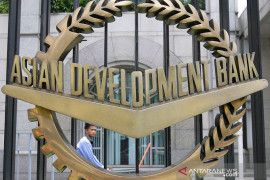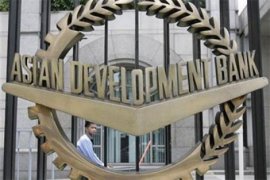Jakarta (ANTARA) - Asian Development Bank (ADB) (REUTERS/Cheryl Ravelo)
ADB Chief Economist Yasuyuki Sawada noted in a statement in Jakarta on Wednesday that the estimate was part of an additional report on the 2019 Asian Development Outlook Update released in September 2019.
In the revision, the ADB had lowered the economic growth forecast in the Asian region since China and India had experienced a decline in growth triggered by multifarous external and domestic factors.
ADB projects growth in the Asian region in 2019 and 2020 to be around 5.2 percent, down from the September forecasts of 5.4 percent and 5.5 percent respectively in 2019 and 2020.
The ongoing trade tension is one of the factors that has lowered projections of economic growth in Asia despite the region being solid.
"The ongoing trade tension is making it tough for the region and is still the biggest risk to the economic projection in the longer term. Domestic investment is also weakening in many countries as business sentiment declines," Sawada explained.
The supplementary report estimates that inflation rate in the region will touch 2.8 percent in 2019 and 3.1 percent in 2020 respectively, up from inflation projections in September of 2.7 percent respectively in 2019 and 2020.
"On the other hand, inflation is rising due to the higher food prices, especially with the African swine fever causing a dramatic rise in the pork prices," Sawada stated.
In the East Asian region, China's growth is estimated at 6.1 percent for 2019 and 5.8 percent for 2020 due to trade tensions and slowing global activity.
Furthermore, the slowdown in China was caused by weak domestic demand, particularly household consumption, due to pork prices having doubled in comparison with last year's prices.
However, growth is expected to accelerate if the United States and China reach a trade agreement.
In September, the ADB forecasts China's economic growth of 6.2 percent in 2019 and six percent in 2020.
Meanwhile, Hong Kong, which has technically been in recession, will experience heavy pressure that is likely to continue until 2020.
The region's economy is now expected to contract 1.2 percent in 2019 and only grow 0.3 percent in 2020.
In Southeast Asia, Indonesia’s condition is still better than several countries, including Singapore and Thailand, that experience a decline in exports and weakening investment.
Related news: Strong domestic consumption to back Indonesia's economic growth: ADB
Related news: Minister encourages development of industrial zones to drive growth
EDITED BY INE









